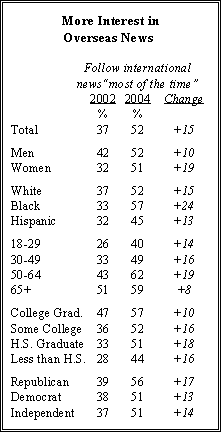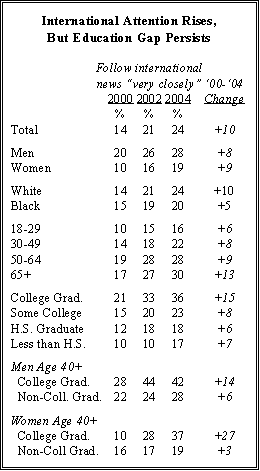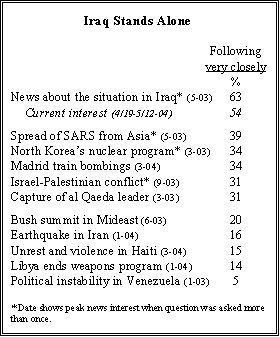Over the past two years, there has been a dramatic rise in the number of Americans who say they closely follow international news most of the time, not just when important events occur. For the first time since the Pew Research Center began asking six years ago, nearly as many Americans say they track international news closely most of the time (52%), as say that about national news (55%) and local news (55%).
Clearly, the continuing violence in Iraq is a major factor behind the increasing interest in overseas news. Indeed, the shift has been especially large among several demographic groups that typically have generally shown low levels of interest in overseas news not directly involving Americans including women, minorities and less-educated Americans. These same groups have paid far closer attention to the war in Iraq than most other international news stories.

In that regard, the small but growing group that expresses serious interest in news on international affairs those who follow this type of news very closely has not become much more demographically diverse. Since 2000, the percentage of Americans who follow news about international affairs very closely has grown from 14% to 24% the largest increase recorded for any category of news. But this core audience for news on international affairs continues to be dominated by well-educated males. In 2000, about twice as many college graduates as people with a high school education said they paid very close attention to news on international affairs; that remains the case in the current survey.
Wider Audience for International News
Two years ago, just 37% of Americans said they followed international news most of the time, compared with 61% who said they paid attention only when major developments occurred. The balance of opinion has shifted, and now a 52% majority tracks international news most of the time.
This shift has come across the demographic and political spectrum, but has been particularly notable among African Americans, women, and those with a high school education or less. Nearly six-in-ten African Americans (57%) say they pay attention to foreign news most of the time, up from 33% in 2002. The gender gap in international news interest has all but disappeared: narrow majorities of men (52%) and women (51%) now say they regularly follow overseas developments. And while education remains a major factor in foreign news interest and news interest generally differences on this score also have narrowed. About six-in-ten college graduates (57%) say they follow overseas news most of the time compared with 49% of those with a high school education or less; two years ago, the gap was about twice as large (47% college graduate/32% high school or less).
While growing numbers of Republicans, independents and Democrats say they routinely follow international news, the biggest increase has come among Republicans (up 17% since 2002). Somewhat more Republicans than Democrats and independents say they follow international news most of the time (56% vs. 51% for Democrats and independents).
More Follow Foreign News ‘Very Closely’

Between 2000 and 2002, the number of Americans who expressed strong interest in international affairs grew by half (from 14% to 21%). That number has increased again, to 24%, in the current survey.
But much of the increase has come among groups that already were highly interested in news about international matters. In most cases, the education, age and gender differences that were evident in 2000 have not narrowed significantly.
However, one notable development has been the sharp increase in the number of female college graduates age 40 and older who say they follow news about international affairs very closely. This percentage has nearly quadrupled since 2000 from 10% to 37%. The gender gap among college graduates age 40 and older has narrowed considerably; from 18 points in 2000 to five points in the current survey.
Foreign News Interest: Iraq Dominates

Beginning in the fall of 2002, the situation in Iraq has dominated the Pew Research Center’s monthly news index. Since then, the high price of gasoline is the only non-Iraq story to lead the monthly index (in April 2004).
Public attention to the Iraq war peaked in May 2003 (at 63%), but has remained at a high level since then. In the current survey, which covered a period of intense fighting in Iraq and the revelations of abuse at Abu Ghraib prison, 54% said they were following developments there very closely.
Since the beginning of 2003, the public has paid only modest attention to foreign news stories, with some notable exceptions. The spread of the SARS epidemic in Asia, with its potential ramifications for the health of Americans, drew widespread attention last May (39% very closely). Nuclear proliferation (North Korea’s nuclear program) has consistently drawn fairly high public interest, as has the Mideast crisis and stories involving overseas terrorism or al Qaeda.
But international stories that are perceived to have little direct impact on American lives and security attract scant interest from the public. This is normally even the case for developments in nearby countries like Haiti and Venezuela. In 1994, there was substantial interest in the U.S. invasion of Haiti to restore President Jean-Bertrand Aristide to power (38% very closely).
Aristide’s ouster at the hands of anti-government rebels this spring and the dispatch of a relatively small number of U.S. forces to Haiti drew much less attention (15% very closely in March). In January of 2003, fewer than one-in-ten Americans tracked developments in Venezuela very closely.




